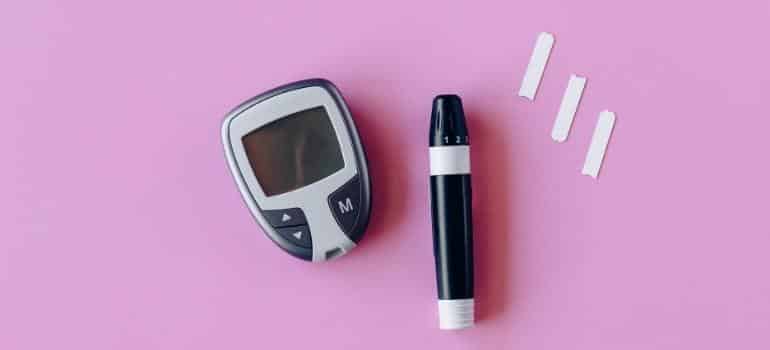Diabetes and Weight Loss
An estimated 415 million people live with diabetes worldwide. Experts report that nearly 13% of the adult population suffers from either type 1 or type 2 diabetes in the US alone. Unfortunately, the number of diabetic patients is only expected to rise as the prevalence of type 2 diabetes grows alongside obesity.
If you have type 1 or type 2 diabetes, losing weight is an effective way to lower your blood sugar levels and improve your overall well-being. In fact, even losing just a few pounds can lead to health improvements.
This article will look in more detail at the biological connections between diabetes and weight loss, exercise and diet tips for diabetes, and medications that may make it easier to lose weight more quickly.
What Is Diabetes?
Diabetes is a long-term, or chronic, medical condition. It is characterized by high blood glucose (blood sugar) levels and low or absent insulin production. Insulin is the hormone that regulates blood sugar levels. In diabetics, glucose levels rise to an unhealthy level because the body no longer produces, or fails to respond to, insulin.
Sustained high glucose levels can lead to serious complications, including heart disease, loss of vision, and kidney failure. The risk of these complications can be reduced by carefully monitoring and managing blood sugar levels to keep readings within the normal range.
Type 1 diabetes tends to affect children and young adults and is caused by an autoimmune attack on cells within the pancreas. The pancreas can no longer produce insulin. As a result, sugar levels rise in the blood.
Type 2 diabetes often occurs later in life and is strongly associated with being overweight or obese. The pancreas not only produces less insulin, but cells elsewhere in the body become less responsive to it. Blood sugar levels therefore increase. Unlike type 1 diabetes, insulin production and sensitivity can be significantly improved by losing weight (
Will Weight Loss Help With Your Diabetes?

Insulin production can only be improved in those with type 2 diabetes. However, weight loss for diabetics, whether diagnosed as type 1 or type 2, will reduce the risk of diabetes-related complications. Furthermore, diabetes weight loss diets can reduce the dose or number of anti-diabetes medications, including metformin, that you need to take (
Many people with type 2 diabetes ask if diabetes can be cured with weight loss. Encouragingly, just a small amount of weight loss can significantly impact your health, while severe calorie restriction can even reverse the progression of the disease (
In trials, moderate weight loss (5-10% reduction from baseline weight) demonstrated the improved function of the cells within the pancreas and increased the body’s responsiveness to insulin.
In turn, these biological adjustments help to lower blood sugar levels (
A recent study found that weight loss via lifestyle changes, including a calorie-controlled diet or weight loss medications, improved glycemic control (control of blood sugar levels). In diabetic patients, losing weight also positively impacted other associated health problems, including high blood pressure and high cholesterol levels. Patients with diabetes-related kidney disease also demonstrated improvements in kidney function (
Type 1 diabetes is not caused by being overweight or obese, and losing weight will not reverse the diagnosis. However, as your weight decreases, you may require a lower insulin dosage each day. Losing weight can also improve your mood, sleep, and energy levels (
Diet Tips for Diabetes
If you are ready to begin your weight loss journey, you must speak to your doctor or diabetes nurse specialist before commencing. This is important because once you have established a healthier, lower-calorie diet, your blood sugar levels are likely to decrease, and your medication requirement may therefore be reduced.
The most effective way to lose weight and improve glycemic control is to create a type 2 diabetes meal plan for weight loss. Some people diet by counting carbohydrates, while others use the plate method. Both diets focus on eating plenty of non-starchy vegetables such as broccoli, green beans, cabbage, or cauliflower.
You should also include a lean protein and whole grains in place of fatty or processed foods.
It is best to rehydrate with water or unsweetened, low-calorie drinks throughout the day, too. A surprising amount of sugar is contained within milk and soft drinks, which will increase your blood glucose and hinder weight loss.
Weighing yourself once or twice weekly and documenting it may help you feel more motivated to persevere with your new, healthy diet.
Exercise Tips for Diabetes
As with dieting, if you are new to exercise, you should speak to your healthcare team before starting a new regimen.
In diabetics, physical activity can improve insulin sensitivity, reduce the risk of heart disease or nerve damage, reduce cholesterol levels, and help you to sleep better.
It is recommended that adults strive for 150 minutes of aerobic exercise each week, but this can be built up gradually. The weekly guide is equal to five 30-minute sessions, which could include a brisk walk, jog, run, cycle, or swim. Even completing the housework counts!
Aerobic exercise includes activity that increases your heart rate and breathing rate so that the muscles use oxygen to burn fuel.
Keeping active is more likely to help you lose weight and help with regulating blood sugar levels. Regular exercise may also improve your mood and self-esteem and reduce anxiety,
Phentermine and Diabetes

Losing weight requires determination, and phentermine has been recognized in trials as a successful diabetes pill for weight loss.
By reducing the perception of hunger, phentermine can make it easier to lose weight. A randomized trial found that those taking phentermine for 28 weeks lost around 5.3kg in weight compared to just 1.5kg in those taking a placebo.
In the same trial, topiramate (Topamax) combined with phentermine (branded as Qysmia) was even more successful than phentermine alone in jump-starting weight loss. Up to 66% of participants lost at least 5% of their baseline weight when taking Qysmia for 28 weeks, compared to just 15.5% of those taking a placebo (
Phentermine can therefore be taken to assist weight loss and diabetes control alongside lifestyle changes such as diet and exercise.
As phentermine is only approved by the FDA for short-term use, it can be a helpful way to develop new, healthier habits that can then be sustained after finishing the course of phentermine.
Conclusion
It is common to ask if weight loss can reverse diabetes. For those with type 2 diabetes, losing weight can improve glycemic control or even reverse the diagnosis. Losing weight can also help prevent diabetes-related complications such as kidney disease or nerve damage.
As type 1 diabetes is an autoimmune condition, weight loss cannot cure the disease. However, it can reduce your insulin requirements and improve your mood and energy levels.
As it can be challenging to make the required lifestyle changes to lose weight, some people choose to take medications such as phentermine to assist in weight loss. Taking a short course of phentermine can increase your chance of losing a clinically significant amount of weight to improve your blood sugar control and overall health.
FAQs
Which diabetes medication should I take for weight loss?
Your doctor will recommend the best drug, or combination of drugs, to manage your glycemic control.
Medications for type 2 diabetes, such as Ozempic (semaglutide), have been proven to lower blood sugar levels and may aid weight loss (
If you are ready to start losing weight as a type 1 diabetic, and phentermine is suitable, this drug may make it easier to stick to a healthier diet.
Which weight loss supplements are suitable for diabetes?
For those looking for an effective supplement to aid weight loss, PhenQ is suitable for most people with diabetes. Containing safe, all-natural ingredients, PhenQ suppresses the appetite and boosts energy levels to promote weight loss of around 1 to 2 pounds per week.
1. Centers for Disease Control and Prevention. What is Diabetes?
2. Wilding JP. The importance of weight management in type 2 diabetes mellitus. Int J Clin Pract. 2014 Jun;68(6):682-91. doi: 10.1111/ijcp.12384. Epub 2014 Feb 18. PMID: 24548654; PMCID: PMC4238418.
3. Diabetes.org.uk. Weight Loss and Diabetes.
4. Franz MJ. Weight Management: Obesity to Diabetes. Diabetes Spectr. 2017 Aug;30(3):149-153. doi: 10.2337/ds17-0011. PMID: 28848305; PMCID: PMC5556579.
5. Centers for Disease Control and Prevention. Diabetes Meal Planning.
6. Centers for Disease Control and Prevention. Get Active.
7. Anderson E, Shivakumar G. Effects of exercise and physical activity on anxiety. Front Psychiatry. 2013 Apr 23;4:27. doi: 10.3389/fpsyt.2013.00027. PMID: 23630504; PMCID: PMC3632802.
8. Aronne LJ, Wadden TA, Peterson C, Winslow D, Odeh S, Gadde KM. Evaluation of phentermine and topiramate versus phentermine/topiramate extended-release in obese adults. Obesity (Silver Spring). 2013 Nov;21(11):2163-71. doi: 10.1002/oby.20584. Epub 2013 Oct 17. PMID: 24136928.
9. Ozempic.com. What is Ozempic?

